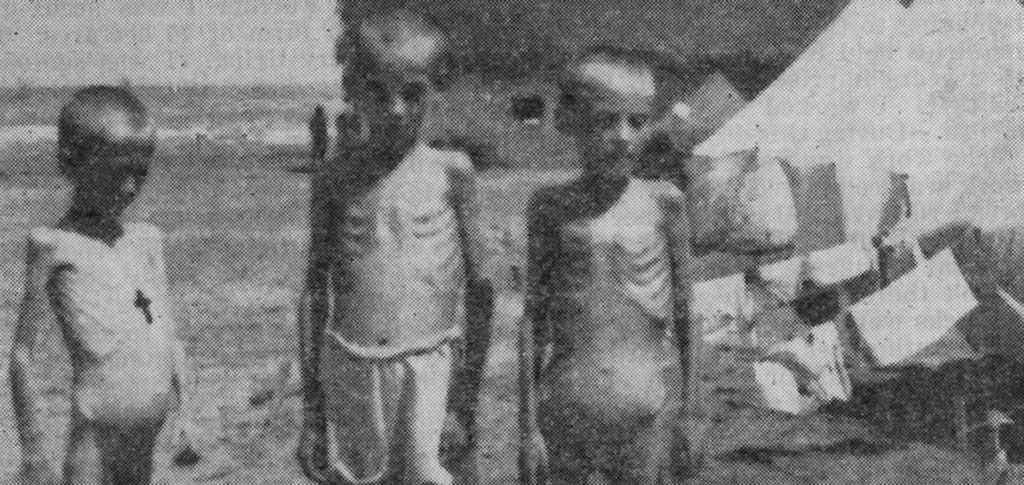The Light of the Candle
Following the August 1939 Hitler-Stalin Pact and the joint German-Soviet invasion of Poland in September 1939, which started World War II, the Soviets began the first mass deportation of Poles on February 10, 1940 from the occupied eastern part of Poland. Whole families were arrested, usually early in the morning, and sent in overcrowded cattle train wagons to forced labor camps in the depths of Siberia and in other parts of the Soviet Union. Many elderly and infants died during the transport–bodies of some of the children tossed by guards into the snow; others left behind at various stops during the journey lasting many days with little food or water. Many more prisoners would die later in the Gulag camps, work settlements and collective farms from slave labor, harsh weather conditions, starvation, and lack of medial treatment.
There was almost a complete media silence in the West about the deportations. Western journalists either did not know or were afraid or unwilling to report on what was happening to millions of Stalin’s prisoners. In addition to Polish citizens, the Soviets also imprisoned and deported Russians, Ukrainians, Belorussians, Lithuanians, Latvians, Estonians, Tatars, Jews and members of many other ethnic and religious groups. Even after the war, the story of the deportees was rarely told. Many of those who had survived the Gulag camps, became homeless refugees in the West.
In memory of all those deported February 10, 1940 to the depths of Russia……and all those who could never return to their homelands.
The Light of the CandleBy Anne Kaczanowski
A cold, frosty window against the darkness of the night
A lonely candle burns with a small flickering light
A small boy watches the flame with curious eyes
Babciu, you lit this candle, can you tell me why?
I lit this candle to remember someone I never knew
Somebody I just heard about when I was as little as you.
This is for my grandparents who never got the chance to see
Their homeland again and a new world with just me.
They lived in a time when their Polish freedoms were taken
On a cold February winter night, all humanity forsaken.
I only knew them from the many stories that were told
How they struggled to survive with hunger and bitter cold.
They never had the chance to get back what they knew
Their lives were destroyed and there was nothing they could do
Their last steps on earth were struggling to return
And I try to remember this as the memory candle burns.
I missed the warm hugs they might have given me
If they had just been given another chance to see
But in my heart I always felt their love stream thru
And from my heart I give Babunia and Dziadek to you.
They were warriors of faith and loved their land
Their fate was unnecessary and hard to understand
They were proud people, gentle and strong
Trapped in a world where so much went wrong.
When the 10th of February comes, remember this light
And the story I will tell you about them tonite.
May the candle burn bright and their memory survive
As their spirit touches us as if they were here and alive.
When I light the candle it is because I hope they will see
That their story will be passed on down to you, thru me
I can feel their smiles from the warmth of the flame
I hope the lit candle will always make you feel the same.
Hania Kaczanowska 2007
Anne Kaczanowski (Hania Kaczanowska) is one of the children of World War II refugees. A poet and an artist who lives in Edmonton, Alberta in Canada, she is the daughter of a former Gulag prisoner and Polish Army soldier Kazimierz Kaczanowski. Her mother Maria Dobrzańska was a Polish slave laborer in Nazi Germany. Her parents met and married in Canada shortly after the war.
Anne Kaczanowski’s poem, “The Light of the Candle” is posted in Silenced Refugees with permission from the author. She wrote her poem in “In memory of all those deported February 10, 1940 to the depths of Russia……and all those who could never return to their homelands.” Her father died in Canada in 1988, a year before before Poland was freed from over 40 years of Soviet-imposed communism. He never saw again his homeland or his family left behind the Iron Curtain.
Read more of Anne Kaczanowski (Hania Kaczanowska) poems
[DISPLAY_ULTIMATE_PLUS]
Photo Credit

- Three sisters, ages 7, 8, and 9, Polish evacuees from Russia, August 1942
- Photos by: Lieutenant Colonel Henry I. Szymanski, U.S. Army
- Source: The Katyn Forest Massacre: Hearings Before The Select Committee to Conduct An Investigation on The Facts, Evidence and Circumstances of the Katyn Forest Massacre; Eighty-Second Congress, Second Session On Investigation of The Murder of Thousands of Polish Officers in The Katyn Forest Near Smolensk, Russia; Part 3 (Chicago, Ill.); March 13 and 14, 1952 (Washington: United States Government Printing Office, 1952), pp. 459-461.
- Link


